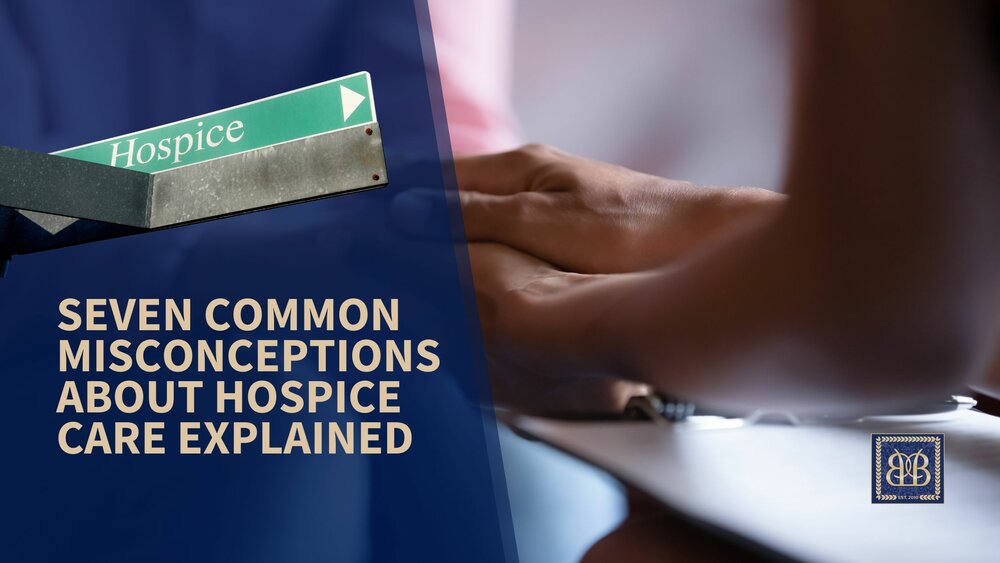Seven Common Misconceptions about Hospice Care Explained
Misconceptions about hospice care often stem from a lack of accurate information and awareness.
The many inaccuracies surrounding hospice care create unnecessary fear and reluctance at a challenging time. Understanding the truth about these valuable end-of-life services can help people make informed decisions for their loved ones.
In this article, we will address seven common misconceptions about hospice care and share facts that can dispel these myths so families can approach this critical life phase with clarity and confidence.
Misconception #1: Hospice care is harsh.
Hospice is not about harshness; it’s about comfort. It’s a philosophy of care that focuses on providing medical, emotional, and spiritual support to patients with a life-limiting illness. The goal is to ensure the best possible quality of life by managing pain and symptoms, offering emotional support, and respecting the patient’s wishes. Far from being harsh, hospice care is designed to be compassionate and supportive, making the patient’s remaining time as comfortable and meaningful as possible.
Misconception #2: Hospice is only for the last few days of life.
Patients can receive hospice care for much longer than just their final days. In fact, hospice care can be provided for six months or even longer, depending on the course of the illness. The earlier hospice care begins, the more time people have to benefit from the comprehensive support it offers. This extended care allows for better management of symptoms, more emotional and spiritual support, and a better quality of life for patients and their loved ones.
Misconception #3: Choosing hospice means giving up all medical treatment.
Hospice care is not about giving up all medical treatment—it means shifting the focus of care. While curative treatments may no longer be effective or desired, hospice places the patient and family at the center of the care-planning process. The focus shifts to high-quality pain management and symptom control to ensure comfort and dignity. This approach includes managing physical symptoms, addressing emotional and spiritual needs, and providing support to the family, ensuring that the patient’s remaining time is as peaceful as possible.
Misconception #4: Those on hospice pass away in a hospital.
Hospice care is designed to meet the patient wherever they are. This means that people can receive hospice care in the comfort of their home, whether that’s a private residence, a nursing home, an assisted living facility, or a hospice residence. The hospice team comes to the patient, providing medical care, emotional support, and spiritual guidance in a familiar and comforting environment. The goal is to allow patients to spend their final days where they feel most at peace, surrounded by loved ones.
Misconception #5: Hospice is just for the elderly.
Hospice services are not just for the elderly—they are for anyone facing a life-limiting illness, regardless of age. Hospice serves patients of all ages, from infants to the elderly, who are dealing with a terminal diagnosis. The care provided is tailored to the needs of the individual, ensuring that each patient receives the appropriate support for their age and condition. Whether the patient is young or old, hospice care focuses on improving quality of life and providing compassionate support during a difficult time.
Misconception #6: Hospice care is one-size-fits-all.
Hospice care is highly personalized and tailored to meet the unique needs of each patient and their family. A care plan is developed in collaboration with the patient and their loved ones, focusing on individual preferences, needs, and goals. This customized approach ensures that each patient receives the specific type of support they want, whether it’s managing symptoms, providing emotional comfort, or addressing spiritual issues.
Misconception #7: Hospice care is expensive.
You may be surprised to learn that hospice services are very accessible and are covered by Medicare, Medicaid, and most private insurance plans. This coverage typically includes all services related to hospice care, such as medications, equipment, and support from the hospice team. For those without insurance, many hospices offer services on a sliding scale or even provide care at no cost, ensuring that everyone who needs hospice can access it regardless of their financial situation.
Hospice is a compassionate, patient-centered approach to end-of-life care that aims to improve the quality of life for patients and their families. By understanding and dispelling the common misconceptions about hospice care, more people can access its rich benefits when they are needed the most.
If you or a loved one are facing a life-limiting illness, we hope this information helps you discover the facts about hospice as a supportive option. Our compassionate professionals are here to answer your questions and provide valuable resources. Please contact us anytime.
About Batchelor Brothers Funeral Services: As a leading African American-owned and operated funeral and cremation organization, Batchelor Brothers Funeral Services has provided a ministry of care to thousands of grieving families. We promise to provide our highest level of distinguished service and respect to families who entrust us to honor their loved ones. With two convenient locations serving North and West Philadelphia, it is always our pleasure to be of service. For more information about our funeral, cremation, memorial, repast, and grief counseling services, please visit batchelorbrothers.com.







Comments